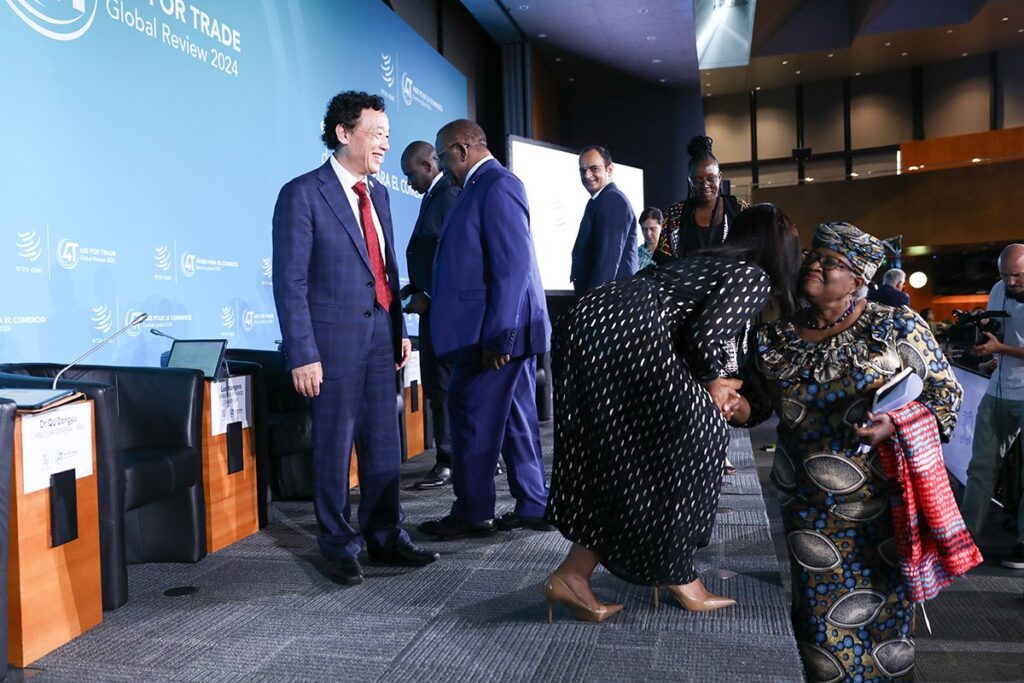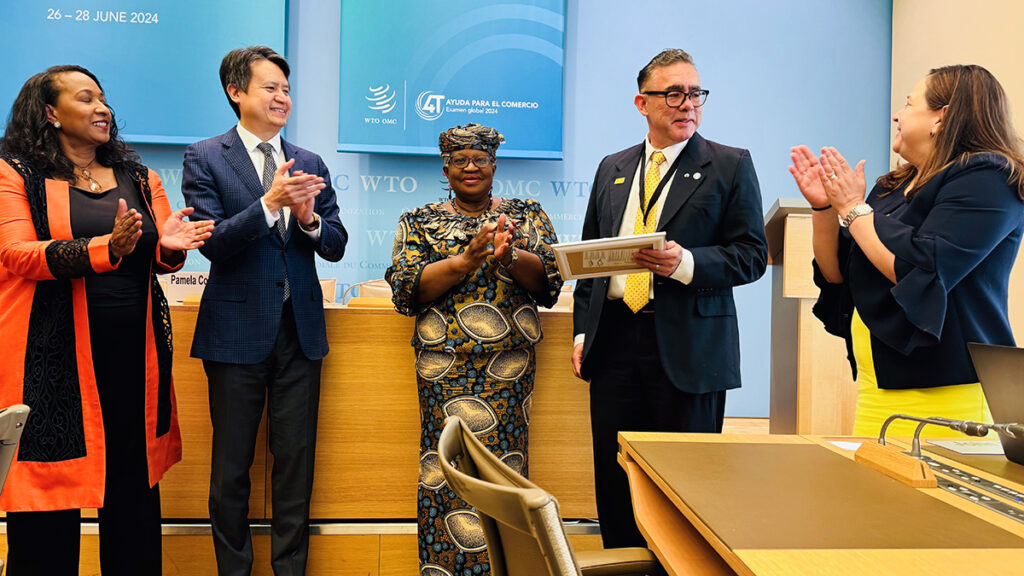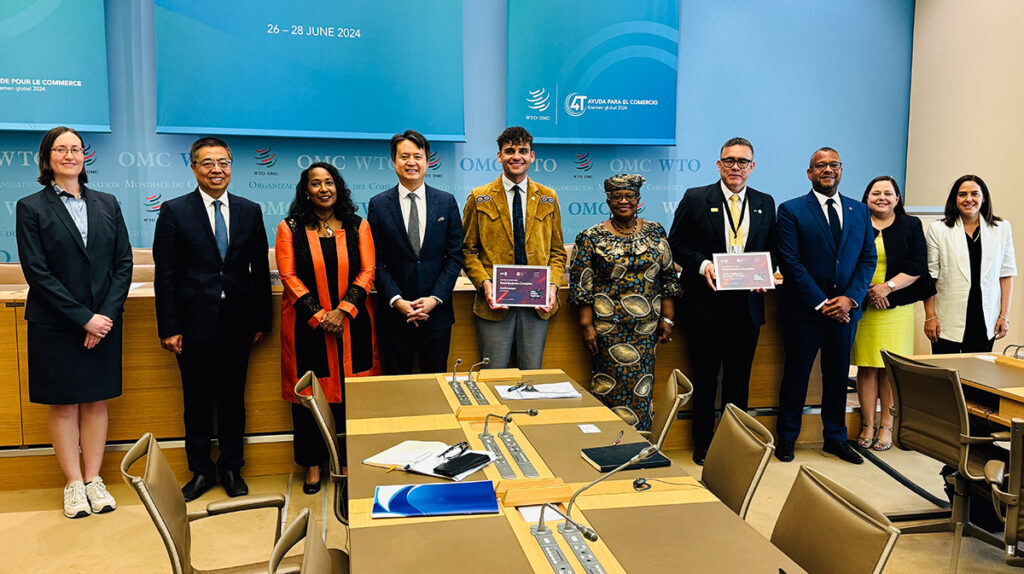FOOD SECURITY, LDCS, SMALL BUSINESS CHAMPIONS TAKE CENTRE STAGE ATAID FOR TRADE
By Raymond Enoch
The 2024 Aid for Trade Global Review on 27 June explored how least developed countries (LDCs) can become more active players in international trade and achieve food security. The event also saw the announcement of the winners of the 2024 Small Business Champions Competition.

Drawing attention on how political conflicts, value chain disruptions and mounting inflation are compromising food security in developing economies, a session entitled “Strengthening food security through trade” explored how the international trade community can act together to enhance access to safe, nutritious and affordable food.
Special emphasis was placed on helping small farmers gain more from trade, for example by boosting their productivity and making their voice heard in international fora. The importance of multi-stakeholder cooperation was also highlighted, notably public-private partnerships.
Speaking as the coordinating economy of the WTO African Group, Chad’s Minister of Trade and Industry, Mathieu Guibolo Fanga, spoke about the importance of Agriculture in African economies for job creation and poverty alleviation.

According to Mr Fanga “Within the multilateral trading system, we seek to benefit more fully from the advantages that African countries possess in the agricultural sector,” he said, placing a particular emphasis on productive capacity. Advancing agricultural multilateral negotiations at the WTO will also be paramount to establishing fair conditions for international trade in agricultural products.”.
Mr Fanga also underlined the challenge arising from climate change. “The disruption of supply chains and expected continued shortages in food supply due to climate change call for urgent action to alleviate food insecurity in Africa,” he said. Building resilience to future food crises will require tailored technical assistance and training to build trade capacities, as well as trade financing to boost production and competitiveness.
Also, the Cameroon’s Minister of Trade, Luc Magloire Mbarga Atangana, said that WTO rules and disciplines provide a basis for meeting food security goals but that more needs to be done. Greater political awareness needs to be raised regarding the challenges associated with food security, he stressed.
Underscoring the importance of the Aid for Trade initiative, Minister Atangana called for shifting the initiative more towards boosting productivity in developing economies with a focus on research related to climate mitigation, and on the availability of inputs such as seeds and fertilizers for poor countries.

“To achieve food security goals, it will be essential for the WTO to pool its efforts with other specialized international organizations such as the UN Food and Agriculture Organization (FAO), the World Food Programme and the World Bank,” Minister Atangana stressed.
Recalling the need for food security to meet the United Nations Sustainable Development Goals, FAO Director-General, Dongyu Qu, called for building “efficient, inclusive, resilient and sustainable Agri-food systems” with improved related trade practices.
“This must come with increased investments in rural infrastructure – including road, energy and broadband – and an improved inclusive market access,” Mr Qu said.
With the world population expected to reach 10 billion by 2050, “we need to increase food production by at least 30 – 40 per cent while minimizing the negative impact on the environment,” he noted. This means “less natural resources consumed such as water and land, and less agricultural input, such as seeds, chemicals and fertilizers.”
Sachin Sharma from India’s Centre for WTO Studies shared insights from India’s experience and Susan Ndung’u from the Farm Input Promotions Africa provided a private sector perspective.
In a related development at the review session, the WTO’s Informal Working Group on Micro, Small and Medium-sized Enterprises (MSMEs) announced two winners of the Small Business Champions Competition to mark “MSME Day” on 27 June. The Group also welcomed Mauritius as its 103rd member.
One of the winners is the Latin American and Caribbean Network of Fairtrade Small Producers and Workers of El Salvador (CLAC), a network representing 1,000 Fairtrade certified organizations in 24 economies in Latin America and the Caribbean. The winning project will survey existing products in Latin America that can benefit indigenous producers, provide training and technical advice, and help indigenous producers identify international markets.
The second winner is O’KANATA of Canada, an organization focused on the empowerment of indigenous youth. Its winning project is for an e-commerce platform that offers a marketplace for indigenous crafts as well as capacity building for entrepreneurs.
The 2024 edition of the Small Business Champions Competition was held under the theme “Empowering Indigenous Peoples’ Economic Development through International Trade”. It was jointly organized by the Informal Working Group on MSMEs, the International Trade Centre (ITC), the International Chamber of Commerce (ICC), and the World Intellectual Property Organization (WIPO).
During the award ceremony, Director-General Ngozi Okonjo-Iweala highlighted how the WTO’s work can foster inclusiveness, including steps taken by WTO members to make it easier for businesses of all sizes to thrive in the global economy. ITC Executive Director Pamela Coke-Hamilton, WIPO Director General Darren Tang, and ICC Secretary General John Denton participated in the award ceremony.
Earlier this week, the WTO Secretariat issued two research notes. The first provides an overview of MSME demographics, their engagement in international trade and the challenges they face. The second note reviews MSME use of digital technology and digitalization in terms of international trade. Both notes draw on data from the technology company Meta’s March 2022 Future of Business (FoB).









